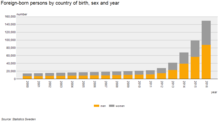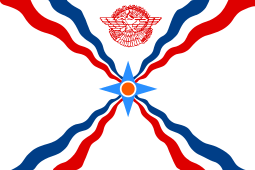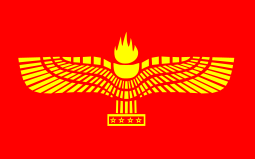Assyrians/Syriacs in Sweden
| Total population | |
|---|---|
| 150,000[1] | |
| Regions with significant populations | |
| Södertälje, Stockholm, Gothenburg, Örebro, Västerås, Norrköping, Linköping | |
| Languages | |
| Aramaic · Swedish | |
| Religion | |
|
Predominantly Christianity (majority: Syriac Christianity; minority: Protestantism) |
Assyrians/Syriacs in Sweden (Swedish: Assyrier/Syrianer) are citizens and residents of Sweden who are of Assyrian (also known as Chaldean or Syriac) descent, there are approximately 150,000 Assyrians in Sweden.[2][3]
Assyrians/Syriacs first came to Sweden from Lebanon for work in the late 1960s when Europe needed laborers for its industries. However, with increased ethnic and religious persecution in their homeland, which is located in present-day southeastern Turkey, northern Iraq, northwestern Iran and northeastern Syria,[4] Assyrian immigration to Sweden increased. Those who had lived in Sweden for a longer period of time were granted residency for humanitarian reasons given the conflicts in their place of origin.[5]
Demographics

Södertälje is seen as the unofficial Assyrian/Syriac capital of Europe due to the city's high percentage of Assyrians/Syriacs. According to Assyrian organization estimates, there are approximately 150,000 Assyrians in Sweden.[7] The Syriac Orthodox Christians number an estimated 30–40,000 people (2016), while higher estimations is 70–80,000, out of which an estimated 18,000 live in Södertälje.[8]
According to Statistics Sweden, as of 2016, there 22,663 are citizens of Iraq (12,705 men, 9,958 women) and 116,384 citizens of Syria (70,060 men, 46,324 women) residing in Sweden.[9]
History
The first Assyrians arrived in 1967 from Lebanon, numbering some 200 people.[10] The migration to Sweden may be broken up into a number of distinct periods. The first group consisted of those that came to work at Swedish manufacturing plants, such as Scania. There were then the subsequent waves after the Turkish invasion of Cyprus in 1974, The Lebanese Civil War in 1975, the rise of Baathism in Iraq & Syria, the Iranian Revolution of 1979, and more recently, from Iraq and Syria as a result of the Iraq Wars (Gulf War in 1991, Iraq War in 2003, Iraqi Civil War in 2014–present) and the Syrian Civil War in 2011–present.
Identity
There is an ideological division of this group in Sweden between[11]
- Aramaenists, adherents of the Syriac Orthodox Church (West Syrian Rite) who insist on the name Syrianer and an "Aramaean" heritage for the group.
- Assyrianists of various denominational backgrounds, who de-emphasize religious adherence in favour of pre-Christian antiquity, who insist on the name Assyrier and an Assyrian heritage for the group.
To account for this division, official Swedish sources refer to the group as "Assyrier/Syrianer",[12] with a slash (similar to the US census, which opted for "Assyrian/Chaldean/Syriac").
Community organisations
The Swedish authorities have granted many rights for Assyrian including their own professional football (soccer) teams like Assyriska FF and Syrianska FC. Also, the Swedish authorities have granted the right of Assyrians to broadcast international TV-channels like Suryoyo Sat and Suroyo TV from the Swedish territory.
Notable people
- Denho Acar, Assyrian militant, born in Midyat, Turkey.[13]
- Ibrahim Baylan, Syriac politician, born and raised in Deir Salih, Tur Abdin, Turkey.[14]
- Abgar Barsom, Syriac-Aramean former footballer.[15]
- Kennedy Bakircioglu, Assyrian footballer,[16] family arrived in 1972 from Midyat.
- Jimmy Durmaz, Syriac footballer,[17] father from Midyat in Turkey.[18]
- David Durmaz, Syriac footballer, family from southeastern Turkey.[19]
- Yilmaz Kerimo, Assyrian-Syriac politician, born in Turkey.[20]
- Suleyman Sleyman, Syriac footballer.[21]
- Sharbel Touma, Aramean footballer, born in Lebanon.[22]
- Daniel Teymur, Syriac MMA fighter.[23]
References
- ↑ https://www.svt.se/nyheter/lokalt/sodertalje/statministerns-folkmordsbesked-kan-avgora-kommunvalet-underskatta-inte-fragan
- ↑ https://www.svt.se/nyheter/lokalt/sodertalje/statministerns-folkmordsbesked-kan-avgora-kommunvalet-underskatta-inte-fragan
- ↑
- ↑ Sargon Donabed (1 February 2015). Reforging a Forgotten History: Iraq and the Assyrians in the Twentieth Century. Edinburgh University Press. pp. 18–. ISBN 978-0-7486-8605-6.
- ↑ Swedish Minister for Development Co-operation, Migration and Asylum Policy, Migration 2002, June 2002 Archived September 26, 2006, at the Wayback Machine.
- ↑ "Foreign-born persons by country of birth, age, sex and year". Statistics Sweden. Retrieved 29 November 2017.
- ↑
- ↑ Prakash Shah; Marie-Claire Foblets (15 April 2016). Family, Religion and Law: Cultural Encounters in Europe. Routledge. p. 183. ISBN 978-1-317-13648-4.
Syriac Orthodox
- ↑ "Foreign citizens by country of citizenship, sex and year". Statistics Sweden. Retrieved 15 November 2017.
- ↑ Tore Wizelius; Lars-Sune Hansson; Sweden. Referensgruppen för folkrörelsefrågor; Sweden. Statens invandrarverk (1984). Föreningar bland invandrare och minoriteter i Sverige. Statens invandrarverk. p. 53.
- ↑ Dan Lundberg, Christians from the Middle East
- ↑ Riksdagens protokoll. Kungl. Boktr. 2001.
assyrier/syrianer
- ↑ Bahar Baser; Paul T. Levin (30 June 2017). Migration from Turkey to Sweden: Integration, Belonging and Transnational Community. I.B.Tauris. pp. 230–. ISBN 978-1-78672-245-4.
- ↑ ""Baylan började hos mig när han var sju år"". SVD.
- ↑ "Syrianske stjärnan Abgar Barsom tackar Syrianska folket". ; Grimlund, Lars (2004). "Artisten Barsom vill vara perfekt". DN.
- ↑ "Zweedse Assyriër in Twente" [Swedish-Assyrian in Twente]. De Pers (in Dutch). 9 March 2007. Retrieved 9 February 2013.
- ↑ Max Wiman (2011). "Ur ilskan växte årets stora succé".
- ↑ "Jimmy Durmaz ska underlätta flytt - kan skaffa turkiskt pass". Fotbolltransfers.
- ↑ "David Durmaz om mötet med sin nya klubb". Svenska fans.
- ↑ "yilmazkerimo". socialdemokraterna.
- ↑ "Sleyman". SVD.
- ↑ "Voormalig FC Twente-speler Touma keert terug naar jeugdliefde". voetbalzone. ; "Touma kan ersätta Porokara". na.se.
- ↑ "UFC-fightern: "Bältet är mitt mål"". SVT.
Further reading
- Svenska kommunförbundet (1982). Assyrier/syrianer: tipskatalog : några fakta om gruppen och några exempel från kommunal verksamhet. Kommunförb.
- Knutsson, Bengt (1982). Assur eller Aram: språklig, religiös och nationell identifikation hos Sveriges assyrier och syrianer. Statens invandrarverk (SIV).
- Klich, I., and Ingvar Svanberg. "Assyrier/syrianer" i." Det mångkulturella Sverige (1988).
- Yalcin, Zeki. "Svenskar och assyrier/syrianer kring sekelskiftet 1900." Multiethnica. Meddelande från Centrum för multietnisk forskning, Uppsala universitet 29 (2003): 24-28.
- Björklund, Ulf. North to another country: the formation of a Suryoyo community in Sweden. Vol. 9. Dept. of Social Anthropology, University of Stockholm, 1981.
- Atman, Sabri. Assyrier-Syrianer. Mesopotamien, 1996.
- Barsom, Gabriella. "En studie om assyriska/syrianska ungdomars språkbruk och språkidentiteter." (2006).
- Berntson, Martin. "Assyrier eller syrianer? Om fotboll, identitet och kyrkohistoria." rapport nr.: Humanistdag-boken 16 (2003).


